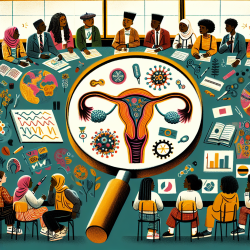The journey of understanding endometriosis among adolescents is not just a medical pursuit but a social one. As practitioners, it's crucial to grasp the broader implications of this condition on young people's lives. The research titled "How do adolescent girls and boys perceive symptoms suggestive of endometriosis among their peers?" provides valuable insights into the perceptions and challenges faced by adolescents with endometriosis symptoms.
The Social Context of Endometriosis Symptoms
This study highlights that endometriosis symptoms are often perceived through various social lenses—family, peers, and community. Adolescents face a unique set of challenges due to societal stigma around menstruation and gender norms. This stigma can significantly impact help-seeking behaviors and overall well-being.
- Mistrust of healthcare providers: Adolescents often distrust healthcare professionals, fearing their concerns will be dismissed or misunderstood.
- Lack of knowledge: Both peers and school personnel frequently lack awareness about endometriosis, leading to misconceptions and inadequate support.
- Gender norms: Societal expectations can exacerbate feelings of isolation and self-doubt among affected girls.
The Role of Education and Stigma Reduction
The findings underscore the need for comprehensive education and stigma reduction efforts. Educating adolescents about menstrual health and endometriosis is vital. Schools should integrate this knowledge into their health curricula to foster a supportive environment.
Engaging Peers and Family
The study suggests that involving peers and family members is crucial in creating an informed support network. Practitioners should encourage open discussions among adolescents, their families, and schools to dismantle the stigma associated with endometriosis.
- Create awareness campaigns: Develop programs that educate both male and female adolescents about menstrual health issues.
- Train school personnel: Equip nurses and teachers with the knowledge to recognize symptoms and provide appropriate support.
- Facilitate peer support groups: Encourage peer-led initiatives that offer a safe space for discussing reproductive health issues.
A Call for Further Research
This research opens avenues for further studies on endometriosis in adolescents. Practitioners are encouraged to delve deeper into how social contexts influence health outcomes. By doing so, they can contribute to developing effective interventions that address both medical and social aspects of the condition.
The implications of this study are profound. By understanding the social dynamics surrounding endometriosis symptoms in adolescents, practitioners can enhance their approach to care. This not only improves individual outcomes but also contributes to a more informed and empathetic society.
To read the original research paper, please follow this link: How do adolescent girls and boys perceive symptoms suggestive of endometriosis among their peers? Findings from focus group discussions in New York City.










